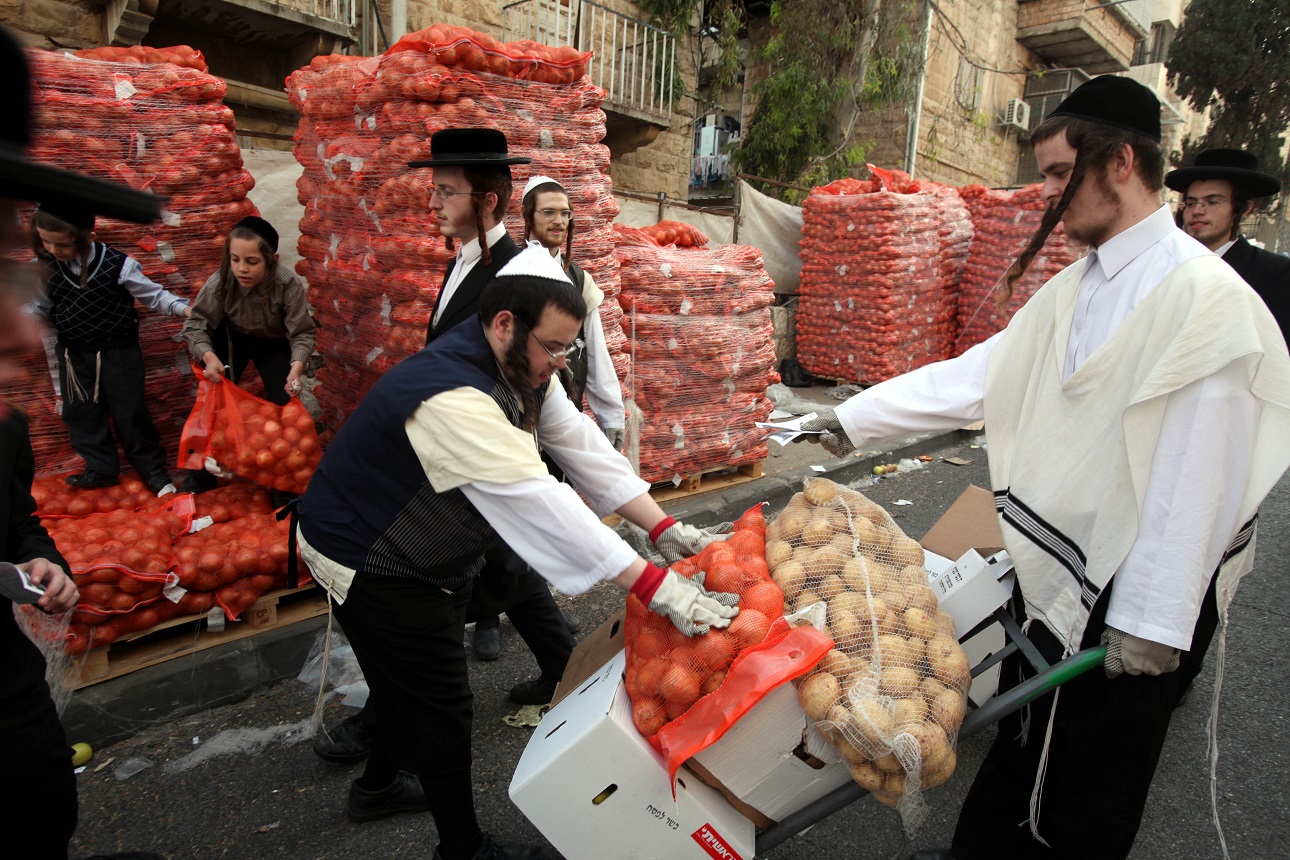When the Wall Shakes
The heroic stories of battle alongside the volunteer spirit that swept the entire nation have shaken the dichotomies nurtured by the Haredi society for years.

Photo by Yossi Zamir/Flash 90
After the events of October 7th, civilian volunteer initiatives began to emerge throughout Israeli society, including the Haredi community. Initiative-takers and organizers set up various command centers to distribute food and necessary items to evacuees and soldiers, and many even opened their homes to anyone in need. The wave of solidarity and mutual aid that swept Israeli society did not bypass the Haredi community and even swept conservatives within the Haredi community, as indicated by a special survey conducted by the Israel Democracy Institute. Tens of thousands of young Haredi men and women volunteered in various command centers; yeshiva students tied tzitzit for soldiers and more.
These initiatives almost immediately encountered vigorous opposition from the rabbinical leadership of the mainstream Littaim (Lithuanian) Haredim. About two weeks after the events began, when the command centers were working at full capacity, a famous rabbi in Bnei Brak said in a sermon that "the heart breaks (...) to see how a considerable part of us has turned into 'tzitzit tiers'." About a week later, the leading Littai rabbi, Rabbi Dov Lando, published an official letter in the Yated Ne'eman newspaper, stating: "Let the Torah learners and all the Haredim know that we have nothing but Torah study, and those engaging in other activities, drawing weak hearts, thinking that salvation comes from them amid all the troubles and dangers surrounding us, should know that their delusion is great, and their harm to themselves, their children, their household members, and others is immense, as our revered rabbis of blessed memory have taught us."
The rabbinical opposition did not stem from disconnection from the general Israeli public. Sectarian websites published videos of rabbis breaking into bitter tears while speaking about the severe blow that struck the people of Israel, and some even emphasized that anyone who does not share the grief of the families of the fallen and the abducted is "separating from the public," which Maimonides rules has no share in the world to come. The sharp opposition stemmed from a fear of a slippery slope of integration into mainstream Israeli society and a sense that the rabbinical leadership felt the Haredi segregation wall was deeply shaken, with unknown consequences.
In a seminal article from 1991, historian Emmanuel Sivan coined the term "enclave culture." According to him, in a world where the individual enjoys the freedom to choose their way of life, the community is constantly threatened by the temptation for individuals to leave the community—based on voluntary organization—and join the majority culture. In response to the temptation, the community erects a mental barrier—"the wall of virtues"—based on moral persuasion that the outside world is morally inferior and hollow. The world is painted in dichotomous colors: those inside are moral, while those outside are wicked, and only corrupt individuals dare to cross the lines.
The ultra-Orthodox rabbinical leadership felt that the severe events deeply undermined the Haredi "wall of virtues." The feeling was that the common argument in the Haredi discourse that Torah study contributes to the state's security - just like military service - lost its persuasive power internally in the face of what was experienced as a real existential threat. In the sermons delivered by the rabbis, there was a noticeable struggle with the public feeling that Torah study does not contribute like fighting on the battlefield. For the first time, the rabbis feared a genuine value crisis concerning the foundational value of the Haredi world—Torah study as an absolute activity.
Additionally, testimonies about civilians who heard what was happening and went south on their own initiative to give their lives to protect others, the daily stories of soldiers fighting heroically and risking their lives in battle, and even paying a heavy price in blood, undermined the "wall of virtues" from the outside. Faced with an incredible display of self-sacrifice and a value-laden discourse of love for the people and the land, even in the face of loss and bereavement, it is difficult to maintain the position that everyone outside the community's wall belongs to the "empty wagon" (as Rabbi Avrohom Yeshaya Karelitz famously called secular society in a meeting with Ben-Gurion).
Anyone listening carefully to the subtext in the Haredi discourse will realize that at the heart of what seems externally like another argument recycling the familiar claims about the draft obligation for yeshiva students and what truly helps protect the people of Israel, lies a deep fear of undermining the wall of segregation and the very justification of this way of life as the only moral way of life.
Eliyahu Berkovits is a researcher in the Ultra-Orthodox in Israel Program at the Israel Democracy Institute.
